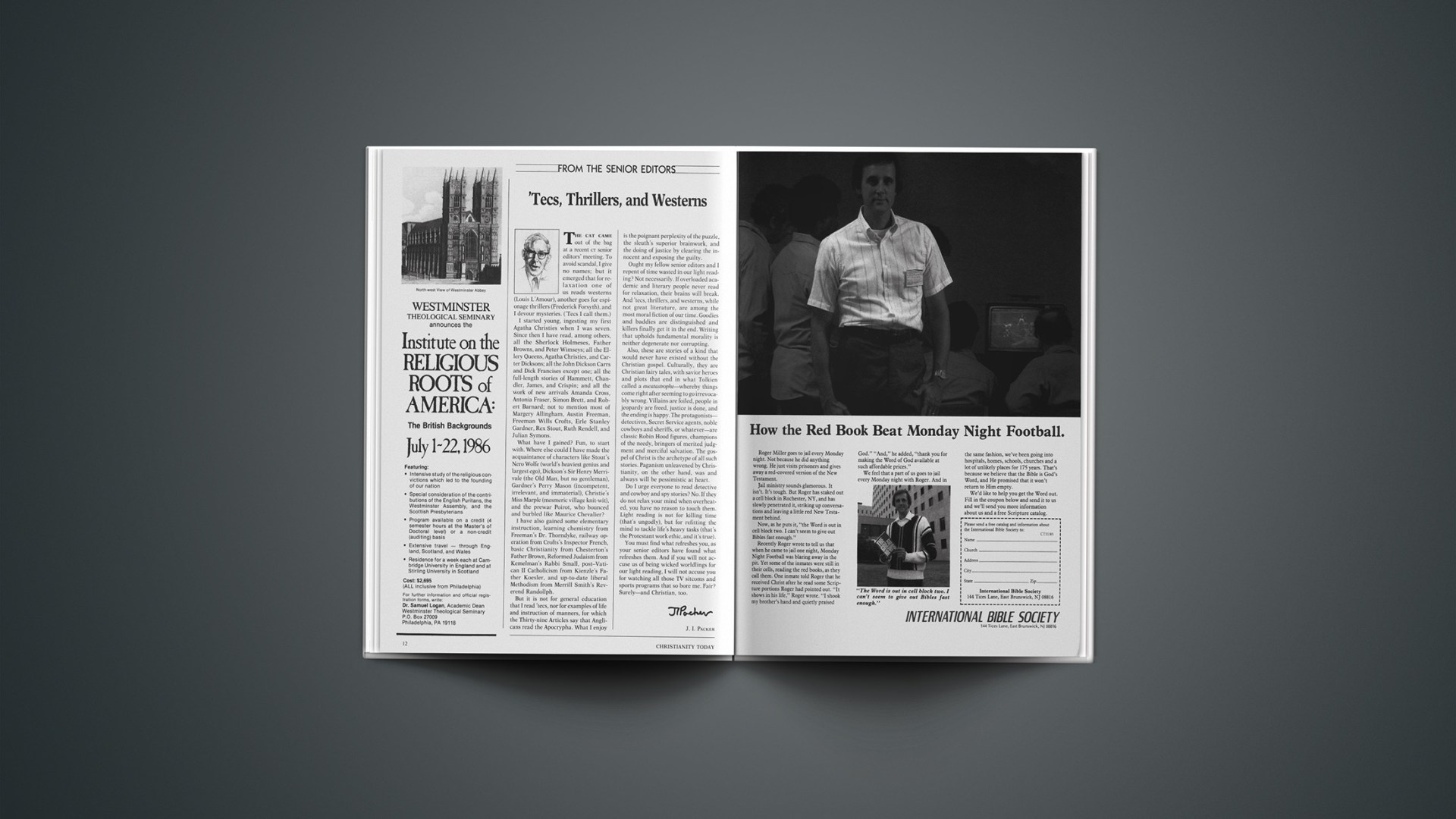The cat came out of the bag at a recent CT senior editors’ meeting. To avoid scandal, I give no names; but it emerged that for relaxation one of us reads westerns (Louis L’Amour), another goes for espionage thrillers (Frederick Forsyth), and I devour mysteries. (’Tecs I call them.)
I started young, ingesting my first Agatha Christies when I was seven. Since then I have read, among others, all the Sherlock Holmeses, Father Browns, and Peter Wimseys; all the Ellery Queens, Agatha Christies, and Carter Dicksons; all the John Dickson Carrs and Dick Francises except one; all the full-length stories of Hammett, Chandler, James, and Crispin; and all the work of new arrivals Amanda Cross, Antonia Fraser, Simon Brett, and Robert Barnard; not to mention most of Margery Allingham, Austin Freeman, Freeman Wills Crofts, Erle Stanley Gardner, Rex Stout, Ruth Rendell, and Julian Symons.
What have I gained? Fun, to start with. Where else could I have made the acquaintance of characters like Stout’s Nero Wolfe (world’s heaviest genius and largest ego), Dickson’s Sir Henry Merrivale (the Old Man, but no gentleman), Gardner’s Perry Mason (incompetent, irrelevant, and immaterial), Christie’s Miss Marple (mesmeric village knit-wit), and the prewar Poirot, who bounced and burbled like Maurice Chevalier?
I have also gained some elementary instruction, learning chemistry from Freeman’s Dr. Thorndyke, railway operation from Crofts’s Inspector French, basic Christianity from Chesterton’s Father Brown, Reformed Judaism from Kemelman’s Rabbi Small, post-Vatican II Catholicism from Kienzle’s Father Koesler, and up-to-date liberal Methodism from Merrill Smith’s Reverend Randollph.
But it is not for general education that I read ’tecs, nor for examples of life and instruction of manners, for which the Thirty-nine Articles say that Anglicans read the Apocrypha. What I enjoy is the poignant perplexity of the puzzle, the sleuth’s superior brainwork, and the doing of justice by clearing the innocent and exposing the guilty.
Ought my fellow senior editors and I repent of time wasted in our light reading? Not necessarily. If overloaded academic and literary people never read for relaxation, their brains will break. And ’tecs, thrillers, and westerns, while not great literature, are among the most moral fiction of our time. Goodies and baddies are distinguished and killers finally get it in the end. Writing that upholds fundamental morality is neither degenerate nor corrupting.
Also, these are stories of a kind that would never have existed without the Christian gospel. Culturally, they are Christian fairy tales, with savior heroes and plots that end in what Tolkien called a eucatastrophe—whereby things come right after seeming to go irrevocably wrong. Villains are foiled, people in jeopardy are freed, justice is done, and the ending is happy. The protagonists—detectives, Secret Service agents, noble cowboys and sheriffs, or whatever—are classic Robin Hood figures, champions of the needy, bringers of merited judgment and merciful salvation. The gospel of Christ is the archetype of all such stories. Paganism unleavened by Christianity, on the other hand, was and always will be pessimistic at heart.
Do I urge everyone to read detective and cowboy and spy stories? No. If they do not relax your mind when overheated, you have no reason to touch them. Light reading is not for killing time (that’s ungodly), but for refitting the mind to tackle life’s heavy tasks (that’s the Protestant work ethic, and it’s true).
You must find what refreshes you, as your senior editors have found what refreshes them. And if you will not accuse us of being wicked worldlings for our light reading, I will not accuse you for watching all those TV sitcoms and sports programs that so bore me. Fair? Surely—and Christian, too.










